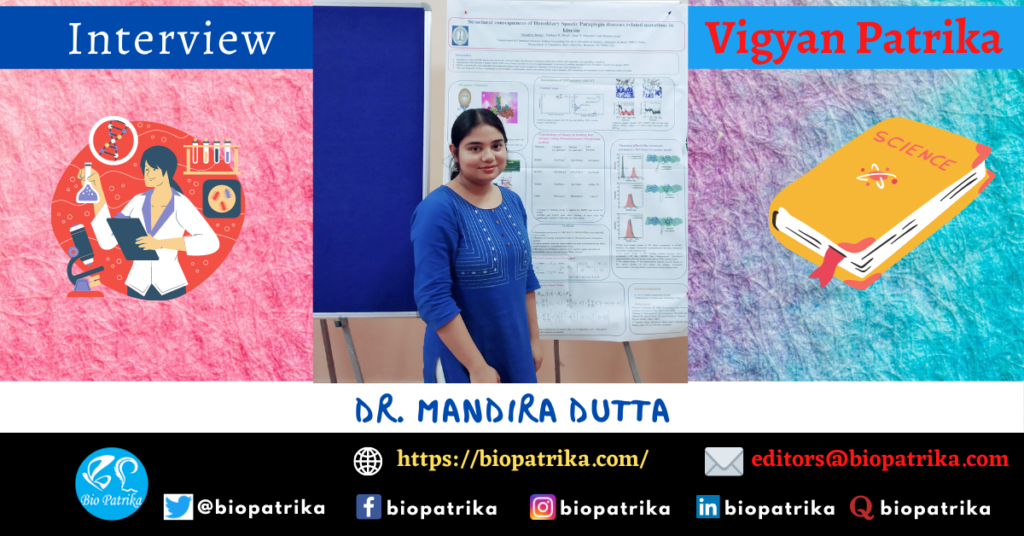Dr. Mandira Dutta’s interview with Bio Patrika hosting “Vigyan Patrika”, a series of author interviews. Dr. Datta pursued her Ph.D. at the Indian Association for the Cultivation of Science (IACS), Kolkata, India, under the supervision of Dr. Biman Jana. In her Ph.D., the primary focus was on the theoretical and computational investigation of molecular motor dynamics and their effects on different disease-related mutations. She obtained her Ph.D. degree in 2020, and currently, she is working as a postdoctoral research scholar in the group of Prof. Gregory A. Voth, Department of Chemistry at the University of Chicago, USA. Her present research focuses on understanding the molecular mechanism of viral dynamics, especially SARS-CoV-2 using molecular dynamics simulation approaches. Here, Mandira talks about her work titled “Mechanistic basis of propofol-induced disruption of kinesin processivity”, published as the first author in Proceedings of the National Academy of Sciences, USA, 2021.
How would you explain your paper’s key results to the non-scientific community?
We are very familiar with the term ‘anesthesia’, and most of us have been gone through this experience once in our lifetime. ‘Propofol’ is an intravenous (IV) sedative agent used to induce and maintain anesthesia during surgeries. Another important term related to this study is ‘motor ‘proteins’. Motor proteins (dynein, kinesin, and myosin) are unique proteins that work as a vehicle in our body to transport different cargoes, including neurotransmitters (e.g., dopamine, δ-aminobutyric acid, or GABA, and enkephalins), synaptic vesicle precursors and neurotrophic factor receptors. Our study focuses on how propofol leads to the malfunctioning of kinesin motor proteins causing inhibition of neuronal signal transfer and loss of consciousness of the patient.

“Our study provides a general idea about the mechanisms of anesthetic agents on motor proteins.”
What are the possible consequences of these findings for your research area?
Our study provides a general idea about the mechanisms of anesthetic agents on motor proteins. Motor proteins follow a specific ‘stress-‘strain’ relation to maintain their walking cycle on the microtubule/actin. Kinesin is a microtubule-based motor protein in which the asymmetric strain between two heads is essential for the forward movement of the walking process. Propofol destroys this asymmetric nature of the two heads, and kinesin losses its signals for the forward movement.
What was the exciting moment (eureka moment) during your research?
For me, the exciting moment was when we found that the propofol disrupts the asymmetric nature of two heads which is a key feature for kinesin movement. From our previous studies on kinesin, we observed that the strain on the front head is much higher than the strain on the rear head when two heads bound with the track, and any perturbation in the front head or rear head may lead to the loss of this asymmetric strain on two heads. Experiments suggest that propofol inhibits kinesin’s processive movement and we are the first study that illustrates the molecular understanding of the reason behind this.
What do you hope to do next?
There are a lot more things to explore. Motor proteins are an extensive and complex system. Our study sheds some light on the part that anesthetic agents can inhibit the signal for the forward movement of the kinesin motor. However, how this effect ultimately leads to disruption of neuronal signal transfer in our body is not well known. Also, further studies on the roles of these sedative agents on other motor proteins (dynein and myosin) are warranted.
Where do you seek scientific inspiration?
“Nothing in life is to be feared; it is only to be understood. Now is the time to understand more, so that we may fear less.” – Marie Curie.
The process of understanding things in a deeper root always makes me curious and motivated. Especially when it comes to the biological systems, they are so complex and heterogeneous they still perform each of their functions in a very orderly manner as a team. To gain molecular insights into biological systems, I pursued my Ph.D. in theoretical and computational biophysics. Here I should undoubtedly mention the role of my Ph.D. supervisor Dr. Biman Jana. He has considerably helped me to clear my vision, understand the subject well, and channelize the energy in the right direction.
How do you intend to help Indian science improve?
Science is the greatest collective endeavor, and scientific research is the wheel of the progress of mankind. As a science student, I would influence India’s young minds about science and scientific discoveries and motivate them to pursue research. Being a researcher, I would contribute to society through my work in the biophysical field primarily focusing on different disease-related areas. Previously, I have worked on diseases related to motor proteins. Currently, I am trying to understand the viral dynamics of SARS-CoV-2 (Covid-19), which is an indispensable topic in the current scenario.
Reference
M. Dutta, S. P. Gilbert, J. N. Onuchic, and B. Jana, Mechanistic basis of propofol-induced disruption of kinesin processivity, Proceedings of the National Academy of Sciences, 2021, 118 (5) e2023659118; DOI: 10.1073/pnas.2023659118.
Email: findmandira@gmail.com
Dr. Bimal Jana lab: http://iacs.res.in/faculty-profile.html?id=100
Edited by: Manveen K Sethi (Volunteer, Bio Patrika)
